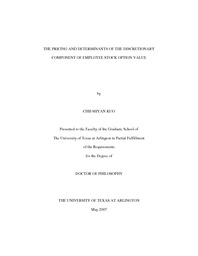| dc.contributor.author | Kuo, Chii Shyan | en_US |
| dc.date.accessioned | 2007-09-19T21:53:10Z | |
| dc.date.available | 2007-09-19T21:53:10Z | |
| dc.date.issued | 2007-09-19T21:53:10Z | |
| dc.date.submitted | May 2007 | en_US |
| dc.identifier.other | DISS-1655 | en_US |
| dc.identifier.uri | http://hdl.handle.net/10106/627 | |
| dc.description.abstract | In this study, I first re-examine the pricing effect of employee stock option (ESO) value. I find a negative association between ESO value and share price, supporting the view that investors view ESO value as an expense of the firm. Further, I find a negative relation between the nondiscretionary component of ESO value (i.e., the expected ESO value) and stock price; this finding indicates that markets view the full ESO value as well as the nondiscretionary component of ESO value as an expense of the firm. Additionally, I find the discretionary component of ESO value (i.e., the unexpected ESO value) is also negatively associated with stock price; this finding suggests that markets price the discretionary component of ESO value as well. Further, I find a positive association between stock price and understatement of ESO value. This result, under the efficient markets hypothesis, indicates that the discretionary component of ESO value for understating firms is likely driven by information incentive. I do not find significant result for overstating firms; this finding is inconsistent with the position that firms over-reporting their ESO values are likely to communicate their private information to outside investors. Moreover, I find a significant negative association between the understatement of ESO value and the proxy for change in firms' future operating risk, after controlling for firms' opportunities and incentives to under-value their option value as well as other firm characteristics. This result supports the information communication perspective that managers communicate their private information about firms' future operating risk by exercising their managerial discretion in ESO value estimates. More importantly, after controlling for these factors, the negative association between understatement of ESO value and firms' future operating risk provides a theoretical interpretation as to the pricing effect of the discretionary component of ESO value for understating firms, in an efficient market. | en_US |
| dc.description.sponsorship | Ho, Li-chin | en_US |
| dc.language.iso | EN | en_US |
| dc.publisher | Accounting | en_US |
| dc.title | The Pricing And Determinants Of The Discretionary Component Of Employee Stock Option Value | en_US |
| dc.type | Ph.D. | en_US |
| dc.contributor.committeeChair | Ho, Li-chin | en_US |
| dc.degree.department | Accounting | en_US |
| dc.degree.discipline | Accounting | en_US |
| dc.degree.grantor | University of Texas at Arlington | en_US |
| dc.degree.level | doctoral | en_US |
| dc.degree.name | Ph.D. | en_US |
| dc.identifier.externalLink | https://www.uta.edu/ra/real/editprofile.php?onlyview=1&pid=416 | |
| dc.identifier.externalLinkDescription | Link to Research Profiles | |

